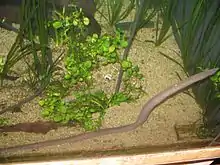| Aquatic caecilians | |
|---|---|
 | |
| Typhlonectes natans | |
| Scientific classification | |
| Domain: | Eukaryota |
| Kingdom: | Animalia |
| Phylum: | Chordata |
| Class: | Amphibia |
| Order: | Gymnophiona |
| Clade: | Apoda |
| Family: | Typhlonectidae Taylor, 1968 |
| Genera | |
|
Atretochoana | |
Typhlonectidae, also known as aquatic caecilians or rubber eels, are a family of caecilians found east of the Andes in South America.[1]
They are viviparous animals, giving birth to young that possess external gills. Of the five extant genera in the family, Atretochoana, Potamotyphlus and Typhlonectes are entirely aquatic, while Chthonerpeton and Nectocaecilia are semi-aquatic [1]. Atretochoana reaches 100 cm (39 in) in length, but other species in the family range from 20 to 60 cm (7.9–23.6 in)[1]. A sixth typhlonectid genus, Ymboirana, was recently described and is known exclusively from fossil material [2].
Taxonomy
- Genus Atretochoana
- Genus Chthonerpeton
- Genus Nectocaecilia
- Genus Potamotyphlus
- Genus Typhlonectes
- Genus Ymboirana
References
- 1 2 3 Vitt, L. J.; Caldwell, J. P. (25 March 2013). Herpetology: An Introductory Biology of Amphibians and Reptiles. Academic Press. p. 453. ISBN 978-0-12-386920-3. OCLC 898295183.
- ↑ Santos, R. O.; Wilkinson, M.; Couto Ribeiro, G.; Carvalho, A. B.; Zaher, H. (2024). "The first fossil record of an aquatic caecilian (Gymnophiona: Typhlonectidae)". Zoological Journal of the Linnean Society. doi:10.1093/zoolinnean/zlad188.
- San Mauro, Diego; David J. Gower; Oommen V. Oommen; Mark Wilkinson; Rafael Zardoya (November 2004). "Phylogeny of caecilian amphibians (Gymnophiona) based on complete mitochondrial genomes and nuclear RAG1". Molecular Phylogenetics and Evolution. 33 (2): 413–427. doi:10.1016/j.ympev.2004.05.014. PMID 15336675.
- San Mauro, Diego; Miguel Vences; Marina Alcobendas; Rafael Zardoya; Axel Meyer (May 2005). "Initial diversification of living amphibians predated the breakup of Pangaea" (PDF). American Naturalist. 165 (5): 590–599. doi:10.1086/429523. PMID 15795855.
- San Mauro, Diego; David J. Gower; Tim Massingham; Mark Wilkinson; Rafael Zardoya; James A. Cotton (August 2009). "Experimental design in caecilian systematics: phylogenetic information of mitochondrial genomes and nuclear rag1". Systematic Biology. 58 (4): 425–438. CiteSeerX 10.1.1.577.2856. doi:10.1093/sysbio/syp043. PMID 20525595.
This article is issued from Wikipedia. The text is licensed under Creative Commons - Attribution - Sharealike. Additional terms may apply for the media files.